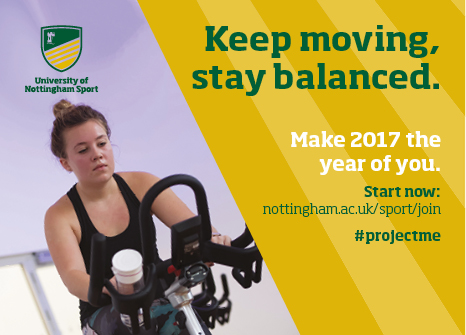
January 10, 2017, by Emma Thorne
On your marks?
It’s estimated that more than two million people in England are regularly putting on their trainers and pounding the pavement in an effort to stay active. So could running be the cheap, effective way for you to get fit for 2017? In the second of our New Year, New You blog series, Roger Kerry, associate professor in the Division of Physiotherapy and Rehabilitation and an avid runner, talks about how best to manage your metamorphosis from coach potato to Forrest Gump.
Now that you have enjoyed the Christmas and New Year celebrations, you will no doubt be ready to burn off some of those calories and get active. Most people start their new year off with the best of intentions of losing weight and getting fit. Last year’s poll on the UK’s most common resolutions showed that losing weight, getting fit, and eating healthier were right at the top of people’s resolutions.
This is great news! However, what is not so great is that less than 10 per cent of people actually go on to achieve their aims for the New Year. So how can we do better and make sure that all of these great resolutions are met?
One problem with New Year’s resolutions is that they have a tone of randomness and desperation about them – “look how much I’ve eaten! I must lose weight”. One of the worse strategies for resolving this is to suddenly try and change your behaviour and go on a crash diet and run 13 miles on New Year’s Day (unless you are a half-marathon runner anyway!). Your enthusiasm will soon wane and you will be back to old habits well before Burn’s Night. Here’s my top three tips to really get fit and active in the New Year:
- Have a long term goal This will ensure you keep going beyond the dark winter months and keep your plan focussed. If you are new to running, start a 9 – 12 week program in January with the goal to run your first 5k in March. By the time you reach March, the sun will be shining (?!) and your behaviour, habits, and lifestyle will have had time to slowly and meaningfully change – you will have become ‘a runner’! Make a note to yourself that this goal is now the start to a long-term, sustainable healthy lifestyle.
- Have short term sub-goals And reward yourself when you achieve these. This will help keep you motivated towards your long term lifestyle change. Having small achievable steps will also stop you doing too much too soon and will therefore help avoid injury. Make these goals realistic and measurable so you can honestly say “I did it!” For example, maybe aim to run continuously for 2km by the end of January and buy yourself some new trainers when you do it. Remind yourself frequently how far you’ve come.
- Share, share, and don’t worry! Tell people what you are doing! Share your progress with your friends on Facebook. This will add another layer of encouragement and motivation. Run and be active with other people, again this will really give you a sense of achievement and enjoyment. Don’t be worried if all doesn’t go exactly to plan and you have a few slips back into old habits. That’s normal. Just relax, reflect, refresh and go again when you’re ready.
Here’s to a healthy and happy 2017.
Roger Kerry is a founding member of the global Movement for Movement project led by ExerciseWorks!


really very nice and informative post…!